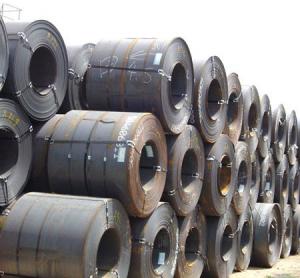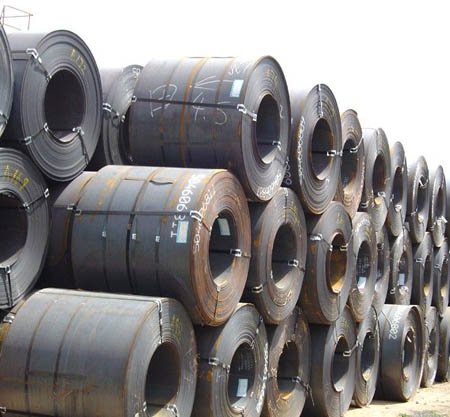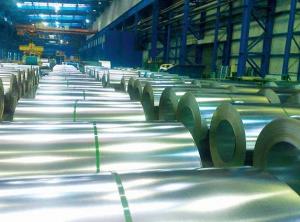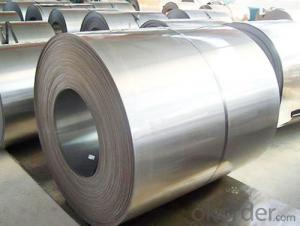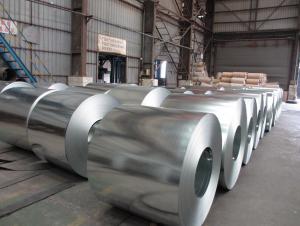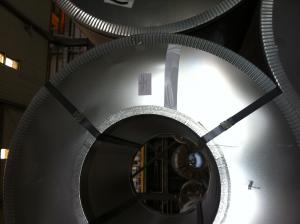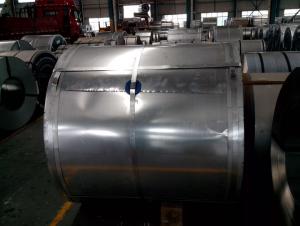Hot rolled steel coil
- Loading Port:
- China Main Port
- Payment Terms:
- TT OR LC
- Min Order Qty:
- -
- Supply Capability:
- -
OKorder Service Pledge
OKorder Financial Service
You Might Also Like
One, introduction
Edit
Hot rolled coil is used for continuous casting slab or slab as raw material, after reheating furnace heating, scales entered the roughing mill in the high pressure water, roughing cut is expected by the head, tail, and then enter the finishing mill, the implementation of the computer controlled rolling, finally after rolling through the laminar cooling (computer controlled cooling rate) and coiling machine coiling, become straight hair volume. Hair straightener roll head, tail often forms a tongue shape and fishtail, thickness, width of poor accuracy, edge has wavy, folding, tower and other defects. The volume weight heavier, steel coil diameter is 760mm. (general pipe industry like use. )
2 two, characteristics
Edit
Because there is no after annealing treatment, the hardness is very high (HRB greater than 90), mechanical processing performance is poor, only a simplebending process has less than 90 degree directional (direction perpendicular to the rolled).
3, use three
Edit
Hot rolled products with high strength and good toughness, easy processing and good forming can be excellent performance of welding, which is widely used in ships, cars, bridges, buildings, machinery, boiler, pressure vesselmanufacturing industry.
The scope of application:
(1) after annealing processing into the common cold;
(2) processing galvanized galvanized unit before the annealing treatment;
(3) the basic do not need to process the panel.
4 four, classification
Edit
Carbon steel plate, carbon plate, low alloy plate, ship plate, bridge plate, boiler plate, container plate etc.. Rolling hard volumes: under normal temperature,the hot pickling volumes of continuous rolling.
Hot rolled steel strip products include steel (roll) and the shear of steel plate.And steel (coils) can be divided into straight and finishes volume (the volume,smooth rolling and slitting roll).
- Q: I have good quality knives that I sharpen with various things, but mostly with a fine, diamond encrusted dry stone (eze lap) . When I run them over the steel, it doesn't seem to make any difference. I've heard that it aligns the edge, whatever that means. Using a steel, is it all just for show ?
- Very okorder
- Q: What are the different types of steel coil finishes used in architectural applications?
- There are several different types of steel coil finishes that are commonly used in architectural applications. These finishes are applied to steel coils to enhance their appearance and provide additional protection against corrosion and weathering. Some of the most popular types of steel coil finishes used in architectural applications include: 1. Mill Finish: This is the most basic type of steel coil finish, where the coil is left untreated after being rolled. It has a dull, gray appearance and is often used in industrial and structural applications where aesthetics are not a primary concern. 2. Hot-Dip Galvanized: In this finish, the steel coil is immersed in a bath of molten zinc, which creates a thick layer of zinc coating on the surface. This finish provides excellent corrosion resistance and is commonly used in outdoor architectural applications such as roofing, gutters, and siding. 3. Galvalume: This finish is similar to hot-dip galvanized, but instead of pure zinc, it uses a combination of zinc and aluminum. Galvalume-coated steel coils offer superior corrosion resistance and are often used in high-end architectural applications, such as metal roofing and wall panels. 4. Pre-Painted: In this finish, a layer of paint is applied to the steel coil before it is shipped to the customer. This allows for a wide range of colors and finishes to be achieved, making it a popular choice for architectural applications where aesthetics are important. Pre-painted steel coils are commonly used in exterior cladding, garage doors, and decorative panels. 5. Stainless Steel: This finish is achieved by using a steel alloy that contains a high percentage of chromium. Stainless steel coils have excellent corrosion resistance and are often used in architectural applications where a clean, modern look is desired, such as handrails, elevator interiors, and kitchen appliances. Each type of steel coil finish offers unique advantages and is suitable for different architectural applications. The choice of finish depends on factors such as the desired appearance, level of corrosion resistance required, and the specific environmental conditions the steel will be exposed to.
- Q: How do steel coils contribute to the manufacturing of appliances?
- Steel coils play a crucial role in the manufacturing of appliances. These coils are typically made from high-quality steel and are used in various stages of appliance production. Firstly, steel coils are used in the fabrication of appliance components. Manufacturers use these coils to create the outer and inner casings of appliances such as refrigerators, washing machines, and dishwashers. The sturdy nature of steel ensures durability and provides a protective barrier for the inner workings of the appliance. Moreover, steel coils are utilized in the production of appliance parts. These coils are often cut, shaped, and formed into smaller components like brackets, frames, and panels. These parts are essential for the proper functioning of appliances and contribute to their overall performance and longevity. Steel coils also contribute to the manufacturing of appliance doors. The coils are molded and shaped to create the doors, which are crucial for the accessibility and safety of the appliance. Steel doors offer strength, security, and insulation, making them an ideal choice for appliances. Furthermore, steel coils are used in the manufacturing of heating elements and burners in appliances like stoves and ovens. These coils are designed to withstand high temperatures and provide efficient heat transfer, ensuring the appliances can cook or bake food effectively. Overall, steel coils are an integral part of the appliance manufacturing process. They are used to create the outer casings, essential components, doors, and heating elements of appliances. The use of steel in these applications enhances durability, safety, and overall performance, making appliances more reliable and long-lasting.
- Q: Steel or stainless steel
- Steel often has impurities that can generate fumes, which cause a fever identical to smoke inhalation. You always need to be concerned about what you are breathing around hot metal.
- Q: How are steel coils used in the production of metal panels?
- Steel coils are an essential component in the production of metal panels. These coils, which are typically made from high-quality steel, serve as the raw material for manufacturing various types of metal panels. To begin the production process, the steel coils are first unrolled and flattened using specialized machinery. This allows for a consistent and uniform thickness throughout the sheet. The flattened steel is then cut into the desired length and width, depending on the specific requirements of the metal panel being produced. Once the steel has been cut, it undergoes further processing, such as cleaning and coating. This is done to remove any impurities and protect the steel from corrosion or damage. The coating also enhances the appearance of the metal panel and provides additional durability and longevity. After the cleaning and coating process, the steel sheets are formed into the desired shape using various techniques, such as roll forming or stamping. This allows for the creation of different types of metal panels, including roofing panels, wall panels, and decorative panels, among others. The steel coils used in the production of metal panels are chosen for their strength, durability, and versatility. Steel is known for its excellent structural properties, making it an ideal material for constructing sturdy and long-lasting metal panels. Additionally, steel is highly resistant to environmental factors, such as extreme weather conditions, which further enhances the durability of the metal panels. In conclusion, steel coils play a crucial role in the production of metal panels. They serve as the raw material for manufacturing these panels and undergo various processes to ensure their quality and durability. The use of steel coils allows for the production of a wide range of metal panels that can be used in various industries and applications.
- Q: How are steel coils used in the manufacturing of construction equipment?
- Steel coils are used in the manufacturing of construction equipment as they provide a strong and durable material for various components. These coils are shaped and processed into different parts, such as frames, chassis, and reinforcements, which enhance the structural integrity and overall performance of construction machinery.
- Q: How are steel coils used in the manufacturing of roofing materials?
- Steel coils are used in the manufacturing of roofing materials as they serve as a primary raw material for producing metal roofing sheets and tiles. These coils are processed through a series of steps such as cleaning, coating, and shaping to create durable and weather-resistant roofing products. The steel coils are rolled out and cut into the desired size and shape, ensuring uniformity and precision in the manufacturing process. These roofing materials made from steel coils offer exceptional strength, longevity, and protection against various weather conditions, making them a popular choice for residential and commercial buildings.
- Q: How are steel coils inspected for chemical composition?
- Steel coils are inspected for chemical composition through a process called spectroscopic analysis. This involves taking a small sample from the coil and subjecting it to various tests, such as X-ray fluorescence or optical emission spectroscopy, to determine the precise elemental composition of the steel. This ensures that the steel meets the required specifications and quality standards.
- Q: Hey everyone.I have a whetstone and a honing steel. I purposely tried to make one of my knives less sharp twice to see how well the whetstone and honing steel would work.It even seemed that when I was using my whetstone it wasn't as sharp as it was when I used my honing steel, but when I also used my honing steel after having sharpened my knife on the whetstone, it was razor sharp.I was wondering, is the whetstone only supposed to be used when the knife edge isn't as flat anymore or something? Like, only when it doesn't really have an edge anymore?Please explain your answer.Thanks everyone.
- In general, whetstones will actually remove metal in order to sharpen a blade, and the angle they're used at is important too. A steel will just straighten the blade between uses, not actually remove metal. The effect is to make it sharper than it was just before, but only because it's straighter. Using a knife makes the very thin edge kind of flatten or even fold over a bit, or get wavy, etc...so the steel just straightens it back out (imagine what happens when the very thin blade gets pressed down repeatedly on a cutting board, or even cuts through foods repeatedly). (A whetstone is used only when steeling finally just isn't enough to get the blade sharp as needed.) .
- Q: Can steel coils be used in the production of automotive parts?
- Yes, steel coils can be used in the production of automotive parts. Steel coils are often used in the manufacturing process of various automotive components such as body panels, frames, chassis, suspension parts, and engine parts. The steel coils are typically processed through various methods such as cutting, stamping, bending, and welding to shape them into the desired automotive parts. Steel is a preferred material for automotive parts due to its strength, durability, and resistance to corrosion. Moreover, steel coils are available in different grades and thicknesses, allowing manufacturers to tailor the material properties to meet specific requirements for different automotive applications. Overall, steel coils play a critical role in the production of automotive parts, contributing to the performance, safety, and longevity of vehicles.
Send your message to us
Hot rolled steel coil
- Loading Port:
- China Main Port
- Payment Terms:
- TT OR LC
- Min Order Qty:
- -
- Supply Capability:
- -
OKorder Service Pledge
OKorder Financial Service
Similar products
Hot products
Hot Searches
Related keywords
